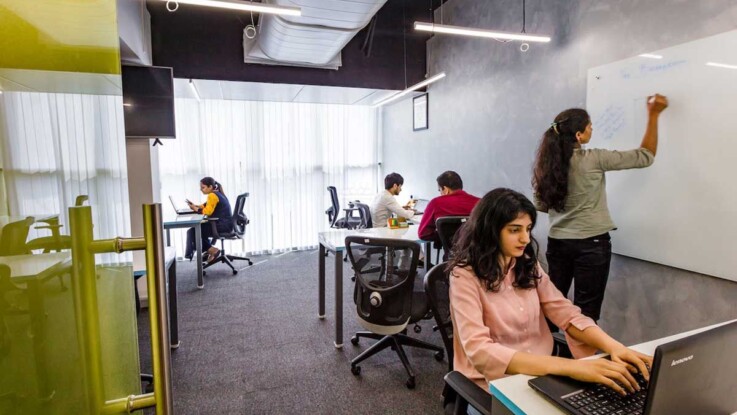Modern Equipment for Coworking Spaces: Essential Tools for Productivity and Success
In today’s fast-paced, collaborative work environments, modern equipment plays a crucial role in keeping coworking spaces efficient, comfortable, and productive. Whether you’re a freelancer, a small team, or a startup, having the right tools at your disposal can make a world of difference. Here’s a breakdown of the modern equipment that every coworking space should consider offering to create an ideal work environment.
1. High-Speed Internet & Networking Infrastructure
The backbone of any coworking space is a fast and reliable internet connection. For most workers today, a seamless online experience is non-negotiable. To ensure productivity:
-
Gigabit-speed internet is ideal for heavy tasks like video conferencing, file sharing, and cloud-based work.
-
Redundant internet connections or backup providers to minimize downtime.
-
Wi-Fi 6 routers offer better speed and capacity for crowded spaces.
This is not just about offering a connection—it’s about providing consistent, reliable access for everyone in the space.
2. Ergonomic Furniture and Workstations
Comfort is key when it comes to staying productive for long hours. Modern coworking spaces provide ergonomic furniture to support both comfort and posture:
-
Height-adjustable desks for sitting and standing work.
-
Ergonomic chairs to reduce strain on the back, neck, and wrists.
-
Adjustable monitor stands and keyboard/mouse setups to allow for an ideal working posture.
Having ergonomic options not only helps prevent discomfort but also boosts the overall well-being and productivity of the people using the space.
3. Collaboration Tools & Conference Rooms
Collaboration is a major benefit of coworking, and modern equipment helps facilitate that. Here are essential tools to improve teamwork and meetings:
-
Interactive whiteboards (e.g., Miro or Microsoft Surface Hub) to brainstorm ideas and visualize projects.
-
Video conferencing equipment (e.g., high-quality cameras, microphones, and speakers) for remote collaboration.
-
Projector screens and AV equipment in meeting rooms to share presentations and data easily.
-
Smartboards or digital flip charts for brainstorming and presentations.
These tools enable fluid communication and make meetings more productive, even when remote team members are involved.
4. Touchless Technology and Smart Controls
The demand for touchless solutions has increased, particularly in light of hygiene concerns:
-
Touchless entry systems using keycards or mobile apps.
-
Smart lighting and temperature controls allow users to adjust their environment via mobile apps or voice commands.
-
Voice-activated assistants (e.g., Alexa or Google Assistant) can be used to schedule meetings, control equipment, and set reminders.
These systems improve user convenience and ensure that members are operating in a hygienic, tech-savvy environment.
5. High-Quality Printers, Scanners, and Copying Systems
While coworking spaces are mostly known for their digital nature, many still require access to physical document handling:
-
Multi-function printers with scanning, printing, and copying capabilities.
-
High-speed document scanners for digitizing documents on the go.
-
Secure printing systems that allow members to print confidential documents with added privacy.
Offering efficient, high-quality print solutions means less hassle for users and more convenience for handling day-to-day tasks.
6. Phone Booths & Soundproofing
As coworking spaces become more bustling and collaborative, privacy becomes a necessity, especially for phone calls and confidential conversations. To accommodate this:
-
Soundproof phone booths equipped with high-quality microphones and headphones.
-
Noise-cancelling headphones for members who need to focus amidst a noisy environment.
-
Quiet zones or dedicated private spaces to encourage focus and protect confidentiality during calls or meetings.
These features ensure that everyone has access to privacy, allowing for undisturbed work time when needed.
7. Coffee Stations and Kitchen Facilities
While this may not seem like “modern” equipment, a well-equipped kitchen and coffee station is essential for any successful coworking space.
-
High-end coffee makers, espresso machines, and cold brew taps keep members fueled throughout the day.
-
Smart refrigerators that track inventory or even offer water-filling stations that minimize waste.
-
Snack bars with healthy options and microwave ovens for breaks.
Food and drink offerings encourage social interactions, offer fuel for productivity, and create a welcoming atmosphere for all members.
8. Cloud Storage and Digital Platforms
To maintain smooth workflows and collaboration, coworking spaces often integrate digital platforms for project management and communication:
-
Cloud storage services like Google Drive, Dropbox, and OneDrive ensure members can store, share, and access their work from anywhere.
-
Collaboration tools like Slack, Trello, or Asana for managing tasks and projects.
-
Time-tracking software like Clockify or Harvest for managing work hours and billing.
This cloud-based ecosystem ensures that team members, whether remote or on-site, stay connected and organized in a digital-first environment.




